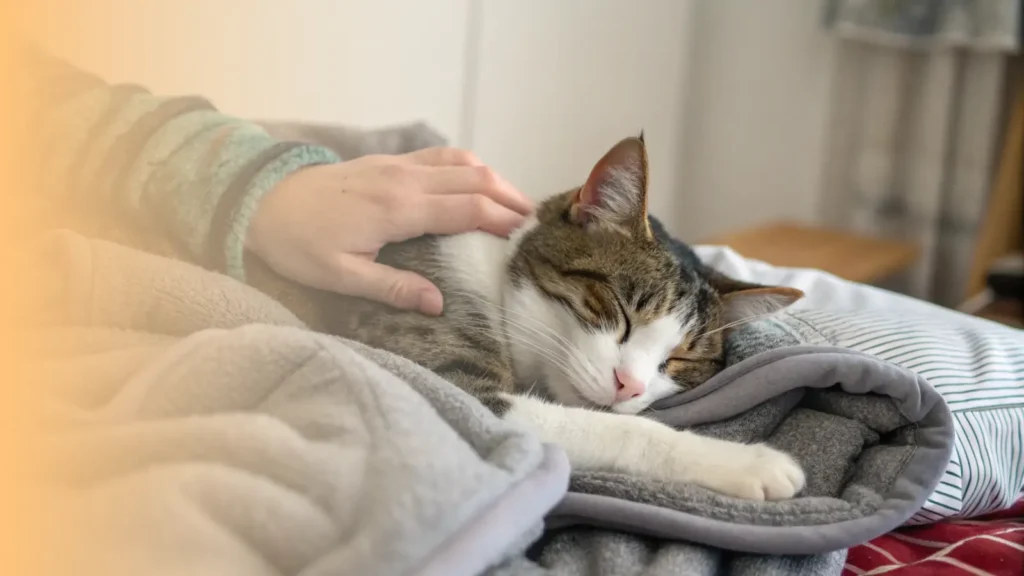Bringing a new baby into your life is incredibly exciting, and as loving pet parents, we naturally think about how our feline family members will feel about the changes.
You might have heard some old wives’ tales or feel a touch uncertain about how your cat will react during your pregnancy. Let’s talk openly about what typically happens with our kitties during this unique time.
Addressing Concerns About Cats and Pregnancy
It’s a thought that crosses many expectant parents’ minds is my cat going to become aggressive now that I’m pregnant? Does pregnancy itself make cats act out? Let’s clear up some common misconceptions right from the start.
1. It’s Not Malice, It’s Communication
First and foremost, let’s put this worry to rest. There’s absolutely no scientific backing for the idea that cats develop ill will or specifically target pregnant individuals.
The notion that a cat might “attack” simply because you’re expecting is usually based on misunderstandings of cat behavior or heightened anxiety during a big life change.
Cats don’t harbor grudges or plan sneak attacks on baby bumps. When people see behavior they interpret as aggressive, it’s almost always the cat’s way of communicating something else entirely.
Often, it stems from fear, stress, or confusion about the shifts happening in their home environment. Seeing things from their perspective helps immensely.
2. Understanding Your Cat’s Reaction to Change
Instead of thinking in terms of an “attack,” it’s far more helpful to see behavioral shifts as reactions.
Pregnancy ushers in a whirlwind of changes routines get adjusted, new furniture arrives smelling strange, your own scent might subtly change, and your energy levels naturally fluctuate. Your cat, being sensitive and often preferring predictability, definitely notices all of this.
True aggression in cats usually comes from feeling scared, cornered, protective of their territory, frustrated by something they can’t reach (like a bird outside), or sometimes even during overly enthusiastic play.
If aggression does appear, it’s a sign that something is stressing your cat due to these changes, not a sign of dislike for the pregnancy itself. So, let’s explore the genuine reasons why your kitty might be behaving differently.
The 5 Reasons Your Cat Might Act Differently During Pregnancy
So, if it’s not intentional aggression, what are the reasons behind potential behavior changes? Veterinary experts highlight several connected factors that influence how our feline companions experience this period of adjustment.
1. Their Amazing Sense of Smell Detects Changes
Cats navigate their world heavily through scent, equipped with millions of olfactory receptors and that special vomeronasal organ for detecting pheromones.
During pregnancy, hormonal shifts cause subtle changes in your body chemistry.
While we can’t say for sure if cats consciously understand “pregnancy” from scent alone, it’s widely believed they can perceive slight alterations in your personal scent signature.
This modification to your familiar smell part of the comforting “group scent” for your cat might intrigue them or make them slightly uneasy.
You might notice your cat rubbing against you more, which is often an attempt to mingle scents and reinforce that familiar family profile.
Others might just seem more curious, while a few sensitive kitties could find the unfamiliar scent stressful, possibly leading to anxiety behaviors.
2. Changes In Routine Can Feel Unsettling
Perhaps even more impactful than scent are the inevitable disruptions to your cat’s daily life. Our feline friends often thrive on predictability knowing when meals happen, when playtime usually occurs, when you settle on the couch.
Pregnancy naturally changes these rhythms. Your schedule might shift due to tiredness or doctor visits, affecting feeding or play consistency.
Preparing a nursery involves new furniture, unfamiliar smells, and maybe rearranging rooms your cat considers their domain.
The attention you’re able to give might also change as your priorities and energy shift. These disturbances to their predictable world can undermine a cat’s sense of security, leading to stress that shows up in their behavior.
3. Picking Up On Your Mood And Warmth
Our cats are often incredibly perceptive when it comes to our emotions. Pregnancy can be a time of great joy, mixed with moments of anxiety, fatigue, or excitement.
Your cat likely senses these fluctuations through your body language, the tone of your voice, and maybe even subtle chemical cues related to stress or relaxation.
They might try to offer comfort when you seem down, become playful during happy moments, or give you space if they sense tension.
Another interesting factor is body heat. Pregnant women often have a slightly elevated body temperature. Since many cats adore warm spots, they might find your lap or simply being near you extra inviting.
This could be one reason why some cats become noticeably more affectionate or seek more cuddle time during their owner’s pregnancy.
4. Natural Instincts Can Surface
While generally subtle in a stable home environment, a cat’s inherent territorial nature can become more pronounced during times of significant change.
Some cats may display heightened protective behaviors towards their pregnant owner, sticking closer than usual or seeming more watchful.
This protective instinct, while often sweet, can occasionally lead to defensiveness towards other pets or even visitors perceived as intruders or competitors for resources and attention.
The influx of new baby items can also feel like an invasion of their territory if not introduced thoughtfully, potentially leading to behaviors like urine marking.
5. Feeling Overwhelmed By Newness
When you combine unfamiliar scents, altered routines, environmental changes, perceived shifts in your mood or attention, and potential territorial pressures, it’s easy to see how a sensitive cat might feel stressed or anxious.
Many of the behavioral changes observed boil down to this underlying feeling of being overwhelmed.
Actions like hiding more often, eating less, meowing more insistently, overgrooming specific spots, or urinating outside the litter box are frequently signs of stress and insecurity.
Recognizing these as signals that your cat needs support, rather than acts of defiance, is key to helping them cope effectively.
Practical Ways to Help Your Cat Adjust Smoothly
Understanding the ‘why’ behind potential behavior changes is the first step. The wonderful news is that you can do a lot proactively to support your furry companion and maintain harmony as your family grows!
1. Keep Routines As Stable As Possible
Since consistency provides comfort, try your very best to maintain your cat’s established schedules.
Keep feeding times, dedicated interactive play sessions, and the frequency of litter box cleaning as predictable as you can throughout the pregnancy and beyond. This gives your cat a vital sense of stability.
If some routines absolutely must change like if your partner will be taking over morning feedings introduce the change gradually.
Begin the transition weeks or even months before the baby is due. This allows your cat to adapt slowly, rather than facing a sudden, confusing shift right when the baby arrives.
2. Create A Cozy Safe Haven
With the house likely becoming busier, it’s crucial your cat has safe, quiet spots to retreat to when they need a break. These “safe zones” allow them to manage their own stress levels.
Think about providing access to vertical spaces like a tall cat tree or sturdy shelves, a comfy covered bed, or ensuring they can access a quiet room where they won’t be disturbed.
Also, make sure essential resources like food bowls, water fountains, and litter boxes remain in easily accessible, low traffic locations where your cat feels secure.
If you need to move a litter box perhaps out of the room designated as the nursery do it very slowly. Move it just a few inches each day over several weeks to prevent confusion that could lead to accidents outside the box.
3. Use Positive Reinforcement Wisely
Rewarding good behavior is the most effective way to guide your cat. When you see your cat being calm near new baby gear, using their scratching post, or interacting gently, offer something they value a tasty treat, enthusiastic praise, a gentle petting session, or a quick game with their favorite toy. This helps them understand what behaviors are encouraged.
It’s incredibly important to never punish your cat for showing fear, anxiety, or related aggression like hissing. Scolding or physical corrections won’t fix the underlying emotion; they will only make your cat more fearful, potentially damage your relationship, and could worsen the behavior.
If you encounter unwanted actions, calmly redirect your cat’s focus to an appropriate outlet (like tossing a toy) or simply remove yourself from the situation if safe.
4. Gently Introduce Baby Related Changes
Help your cat form positive or neutral associations with baby related things before your little one arrives. Play recordings of baby sounds (crying, cooing) starting at a barely audible volume while your cat is relaxed and happy perhaps during mealtime or gentle petting.
Gradually increase the volume over days or weeks, always ensuring your cat stays calm. If they seem stressed, lower the volume and proceed more slowly.
Start using small amounts of baby lotions or powders on your own skin beforehand, allowing your cat to associate these new scents with pleasant interactions with you.
Introduce new baby furniture and equipment one piece at a time, well in advance of your due date, giving your cat plenty of time to sniff and investigate these new objects freely.
After the baby is born but before you bring them home, have someone bring a receiving blanket or worn piece of clothing with the baby’s scent into the house. Place it in a quiet area for your cat to explore at their own pace.
5. Prevent Boredom With Play And Enrichment
A cat whose physical and mental needs are met is generally less prone to stress related behaviors.
Maintain regular interactive play sessions using wand toys or even laser pointers (just be sure to let them “catch” a physical toy at the end to avoid frustration). This satisfies their natural hunting drive and burns energy positively.
Offer puzzle feeders that require them to figure out how to get treats, provide various types of scratching posts in key locations, ensure access to windows for watching the world go by, and make sure they have high places to climb and survey their kingdom.
These enrichment activities provide essential stimulation, especially important when your available time for interaction might become more limited.
6. Consider Calming Aids With Your Vet
While behavior and environmental strategies are the foundation, certain products might offer additional support.
Synthetic feline pheromone products, available as diffusers or sprays (like Feliway), mimic the calming signals cats use naturally.
They can help create a more secure feeling environment for some cats during periods of change, but work best alongside other management efforts.
You might also see various over the counter calming supplements. Some ingredients, like L theanine or milk protein derivatives, may help with mild anxiety in some cats, but solid scientific proof is often lacking, and product quality can vary.
Always consult your veterinarian before giving your cat any supplements or medications. For more significant anxiety or aggression, your vet is the only one who can assess if prescription medications are appropriate and how to use them safely.
7. Manage Spaces For Safety And Comfort
Sometimes, controlling access to certain areas is necessary for everyone’s well being. Tall baby gates that are tricky for cats to jump, screen doors, or simply keeping the nursery door closed can effectively manage where your cat goes, especially when unsupervised.
This helps ensure the baby’s safety and prevents your cat from feeling trapped or overwhelmed in that specific space.
To prevent your cat from napping in the crib which is a safety hazard for infants you can use commercial crib tents or nets designed for this purpose.
Another option is to make the crib mattress temporarily uninviting when the baby isn’t there, perhaps using double sided sticky tape or specially designed plastic mats with nubs.
A Quick Word On Toxoplasmosis Safety
It’s common for the topic of toxoplasmosis to come up during pregnancy, sometimes causing undue worry about family cats. It’s helpful to separate this specific health concern from general cat behavior.
1. Knowing The Actual Risk
Toxoplasmosis is an infection caused by a parasite. If a woman contracts it for the very first time while pregnant, it can potentially pose risks to the developing baby.
However, the main ways people become infected are typically through eating raw or undercooked meat containing the parasite, or by accidentally ingesting the parasite’s eggs from contaminated soil (perhaps while gardening) or unwashed vegetables.
Cats can shed these eggs in their feces, but usually only for a limited time after their initial exposure (often through hunting infected rodents or birds, or eating raw meat).
Crucially, these eggs need 1 to 5 days in the environment after being passed in feces to become infectious. Therefore, the risk posed by an indoor cat that eats commercial cat food and doesn’t hunt is generally considered quite low.
2. Simple Steps For Peace Of Mind
You can easily minimize any potential risk by practicing good hygiene. Thoroughly cook all meat. Wash your hands well after handling raw meat, gardening, or touching soil (wearing gloves for gardening is wise).
Wash all fruits and vegetables carefully. If possible, have another member of the household take charge of cleaning the litter box daily.
If you need to scoop the litter box yourself, wear disposable gloves and wash your hands thoroughly afterward. Daily scooping is key because it removes feces before any potential parasite eggs have time to become infectious.
Keeping your cat indoors and feeding them cooked or commercial diets further reduces any minimal risk.
These sensible precautions make it perfectly safe to continue enjoying life with your beloved cat throughout your pregnancy.
Final Thoughts
While the dramatic idea of cats targeting pregnant owners is unfounded, the reality is that pregnancy brings changes that our sensitive feline companions definitely notice.
Understanding that their behavioral shifts stem from adjusting to new routines, scents, and environments allows us to respond with patience and support.
By preparing proactively, maintaining routines where possible, providing safe spaces and enrichment, and using positive reinforcement, you can help your cat navigate this transition successfully, ensuring they continue to be a cherished part of your growing family.








